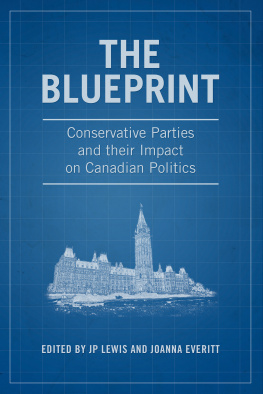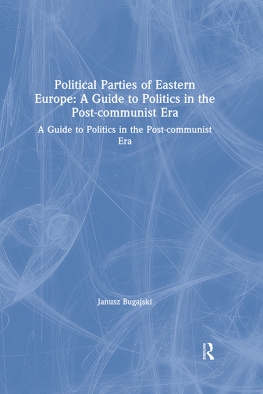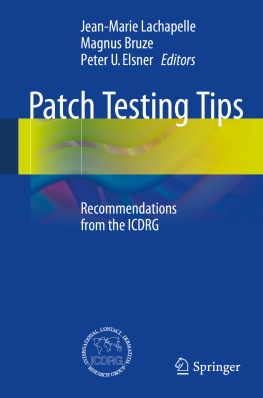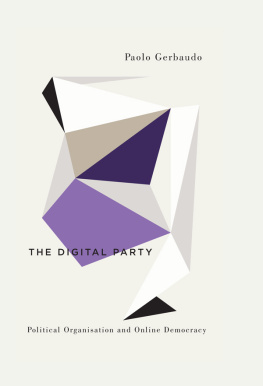Guy Lachapelle - Political Parties in the Digital Age: The Impact of New Technologies in Politics
Here you can read online Guy Lachapelle - Political Parties in the Digital Age: The Impact of New Technologies in Politics full text of the book (entire story) in english for free. Download pdf and epub, get meaning, cover and reviews about this ebook. year: 2015, publisher: Walter de Gruyter, genre: Politics. Description of the work, (preface) as well as reviews are available. Best literature library LitArk.com created for fans of good reading and offers a wide selection of genres:
Romance novel
Science fiction
Adventure
Detective
Science
History
Home and family
Prose
Art
Politics
Computer
Non-fiction
Religion
Business
Children
Humor
Choose a favorite category and find really read worthwhile books. Enjoy immersion in the world of imagination, feel the emotions of the characters or learn something new for yourself, make an fascinating discovery.
- Book:Political Parties in the Digital Age: The Impact of New Technologies in Politics
- Author:
- Publisher:Walter de Gruyter
- Genre:
- Year:2015
- Rating:5 / 5
- Favourites:Add to favourites
- Your mark:
- 100
- 1
- 2
- 3
- 4
- 5
Political Parties in the Digital Age: The Impact of New Technologies in Politics: summary, description and annotation
We offer to read an annotation, description, summary or preface (depends on what the author of the book "Political Parties in the Digital Age: The Impact of New Technologies in Politics" wrote himself). If you haven't found the necessary information about the book — write in the comments, we will try to find it.
Guy Lachapelle: author's other books
Who wrote Political Parties in the Digital Age: The Impact of New Technologies in Politics? Find out the surname, the name of the author of the book and a list of all author's works by series.
Political Parties in the Digital Age: The Impact of New Technologies in Politics — read online for free the complete book (whole text) full work
Below is the text of the book, divided by pages. System saving the place of the last page read, allows you to conveniently read the book "Political Parties in the Digital Age: The Impact of New Technologies in Politics" online for free, without having to search again every time where you left off. Put a bookmark, and you can go to the page where you finished reading at any time.
Font size:
Interval:
Bookmark:

e-ISBN (PDF) 978-3-11-041381-6
e-ISBN (EPUB) 978-3-11-042373-0
A CIP catalog record for this book has been applied for at the Library of Congress.
The Deutsche Nationalbibliothek lists this publication in the Deutsche Nationalbibliografie;
detailed bibliographic data are available on the Internet at http://dnb.dnb.de .
Cover illustration: Fakhri-sa/Thinkstock
New Technologies: Helping Political Parties and the Democratic Processes or Threatening Them?
Innovations in Information Technology in American Party Politics Since 1960
Internet, Social Media Use and Political Participation in the 2013 Parliamentary Election in Germany
The Decline of Activism in Political Parties: Adaptation Strategies and New Technologies
Party Activists and Partisan Communication in Quebec
Changing Communications? Political Parties and Web 2.0 in the 2011 New Zealand General Election
Social Media and American Presidential Campaigns: The Dark Side of the Electoral Process
The United Kingdom Independence Party (UKIP) and the British Press: Integration, Immigration and Integrity
Political parties and the Internet: changes in society, changing politics the case of the Parti Qubcois
Political communication, electronic media and social networks in France
Font size:
Interval:
Bookmark:
Similar books «Political Parties in the Digital Age: The Impact of New Technologies in Politics»
Look at similar books to Political Parties in the Digital Age: The Impact of New Technologies in Politics. We have selected literature similar in name and meaning in the hope of providing readers with more options to find new, interesting, not yet read works.
Discussion, reviews of the book Political Parties in the Digital Age: The Impact of New Technologies in Politics and just readers' own opinions. Leave your comments, write what you think about the work, its meaning or the main characters. Specify what exactly you liked and what you didn't like, and why you think so.











